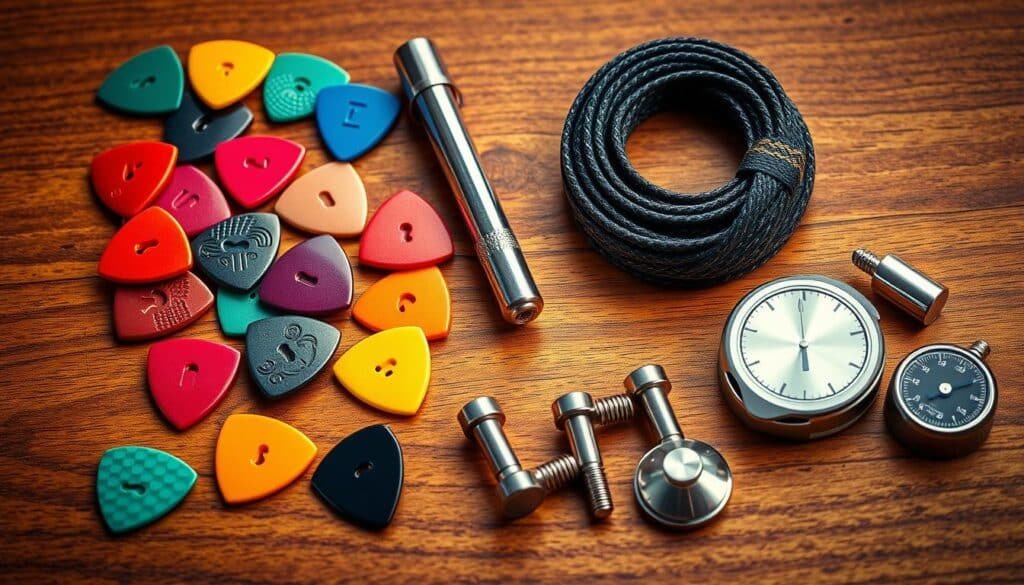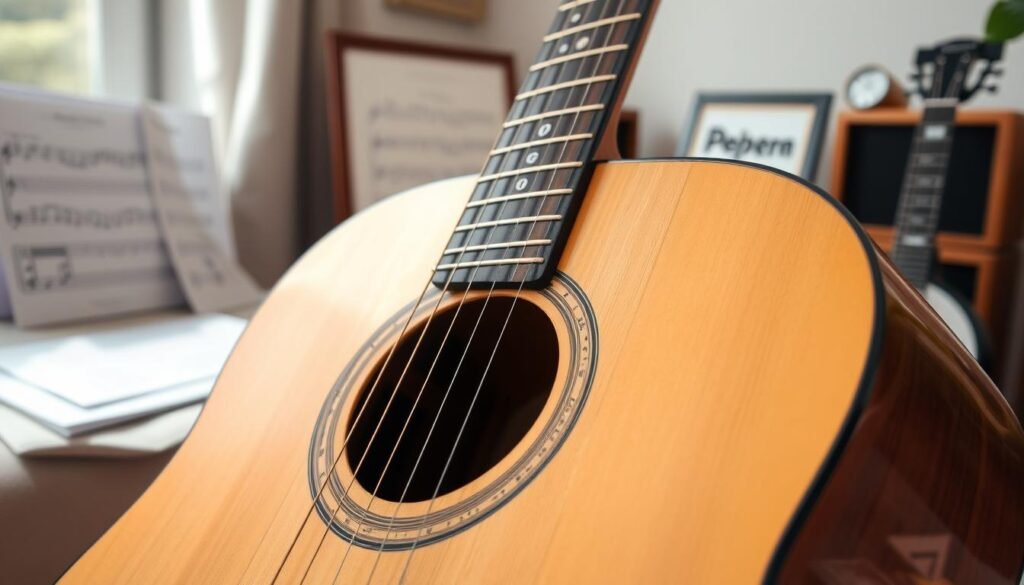Learn To Play The Guitar For Beginners Starting to learn guitar can be a rewarding journey. It brings many benefits, like expressing emotions, improving focus, and making new friends. This guide will help you begin your musical journey. You’ll learn how to pick the right guitar and master basic skills. With dedication and practice, anyone can start playing the guitar and explore the world of music.
Also Read: Analyzing The Role Of Harmony In Contemporary Pop Music
Key Takeaways
- Learning guitar as a beginner can unlock emotional, mental, and social benefits.
- This guide provides a step-by-step approach to starting your guitar journey.
- Choosing the right guitar and essential accessories is the first step.
- Mastering fundamental techniques, such as proper posture and tuning, is crucial.
- Consistent practice and incorporating chord progressions and finger exercises are key to progress.
Get the Right Guitar for Your Needs
Choosing the right guitar is key for beginners. Acoustic guitars, like classical and steel-string models, are great because they’re easy to play and affordable. They come in different sounds for various music styles and what you like.
Also Read: The Impact Of Classical Music On Cognitive Development
Acoustic Guitars
Classical guitars have nylon strings and give a soft, mellow sound. They’re perfect for classical, flamenco, and traditional music. They’re smaller and have a wider neck, great for smaller hands or beginners.
Steel-string acoustic guitars sound bright and loud. They’re used in folk, country, and rock music. These guitars have a narrower neck and are a bit harder to play but sound powerful.
It’s important to pick an acoustic guitar that feels good in your hands and fits your body size. This makes learning easier and helps you improve faster.
| Feature | Classical Guitar | Steel-string Acoustic Guitar |
|---|---|---|
| String Material | Nylon | Steel |
| Tone | Soft, mellow | Bright, loud |
| Neck Width | Wider | Narrower |
| Common Uses | Classical, flamenco, traditional music | Folk, country, rock |
When picking an acoustic guitar for beginners, think about the music you want to play and how comfortable you need it to be. Whether you go for a classical guitar or a steel-string acoustic guitar, the right one will make learning fun and rewarding.
Also Read: How To Write Music?
Essential Accessories for Beginners

Starting to learn guitar? You’ll want a few key accessories to make your journey better and help you get better at playing. These tools keep your guitar in great shape and make practicing easier.
A guitar tuner is a must-have for beginners. It can be a clip-on model or a tuning app. Keeping your guitar in tune is key for a clear sound. With a good tuner, you can always make sure your guitar sounds right, letting you focus on playing.
Don’t forget guitar picks. They come in many shapes, sizes, and thicknesses. Trying out different picks can help you find what works best for you. This can improve how you strum and pick.
Also Read: Top Benefits Of Music Education For Kids: Why Every Child Should Learn Music
- Also, get a comfy, adjustable guitar strap. It keeps your guitar steady, especially when you’re standing. This lets you move more freely and keep a good posture.
- Lastly, keep some spare strings ready. Strings can break, and having extras means you won’t have to stop playing to get new ones.
| Accessory | Purpose |
|---|---|
| Guitar Tuner | Keeps the guitar in optimal pitch for clear, harmonious sound |
| Guitar Picks | Provides versatile tools for strumming and picking techniques |
| Guitar Strap | Stabilizes the instrument, particularly when playing while standing |
| Spare Strings | Ensures the ability to quickly replace broken strings and continue playing |
These key accessories make learning guitar better and help you get the skills you need. By getting these items, beginners can focus on improving their playing and enjoying the journey of learning guitar.
Learn To Play The Guitar For Beginners

To become a skilled guitarist, start with a strong foundation. We’ll show you how to learn guitar basics. This includes understanding your instrument and practicing key techniques.
Also Read: Top Music Streaming Services Of 2024: Which One Is Right For You?
Step 1: Understanding Your Guitar
First, get to know your guitar’s parts like the body, neck, fretboard, and strings. Knowing these will help you play better and understand how it makes sound.
Step 2: Proper Posture and Hand Positioning
It’s important to sit right and place your hands well on the guitar. Keep your back straight, shoulders down, and hands on the neck and strings comfortably.
Step 3: How to Tune Your Guitar
Knowing how to tune your guitar is key. You can use a tuner or tune by ear. This keeps your chords and tunes sounding right.
Step 4: Basic Finger Exercises
Do finger exercises often to make your hands more agile and strong. These exercises make playing the fretboard easier and get you ready for harder skills.
Step 5: Basic Chords and Strumming Patterns
Learn basic open chords and simple strumming patterns. These skills are the base for playing many songs.
Step 6: Reading Chord Diagrams and Tablature
Get used to reading guitar chord diagrams and guitar tabs. They help you know how to play notes and chords.
Step 7: Finding Songs to Learn
Pick songs you like and start playing them. Use a metronome to improve your rhythm and timing. This helps as you learn guitar basics and beginner guitar techniques.
“The guitar is the most universal of all musical instruments, the most complete, the most perfect. It is the instrument par excellence.”
– Hector Berlioz
Mastering Chord Progressions and Finger Positions

As you move forward in your guitar journey, learning about guitar chord progressions and finger positions is key. Chord progressions are the basics of harmony. Knowing common ones like I-IV-V and ii-V-I opens up a world of songs. Understanding chords in a key helps you compose, improvise, and grasp music structure.
Improving your finger skills and getting to know the fretboard is also vital. Regular practice with guitar fingering techniques, such as scales and chord shapes, makes finger positions second nature. This lets you play faster and more accurately. Mastering these music theory for guitar basics makes navigating the guitar neck easier and more smoothly.
“The true power of the guitar lies in the seamless integration of chord progressions and finger dexterity. Embrace this journey, and unlock the musical possibilities that await you.”
Spending time on chord progressions and finger positions takes your guitar playing to a new level. It brings more expressiveness and creativity to your music. The journey to becoming a skilled guitarist starts with these key skills.
Tips for Consistent Practice and Progress

Keeping up with regular practice is key to getting better at guitar. It doesn’t matter if you’re just starting or have been playing for years. Just 15-20 minutes of practice every day can make a big difference. Break your learning into easy steps and celebrate your wins along the way.
Make sure to practice different things like technical exercises, chord progressions, and songs you love. Doing ear training exercises can also boost your musical skills. Plus, think about joining online guitar groups or finding a local teacher for help and support. Being patient, persistent, and loving the guitar will help you the most in your learning.
Strategies for Consistent Guitar Practice
- Set a regular practice schedule, even if it’s just a few minutes a day.
- Make learning easier by breaking it down into smaller steps.
- Always celebrate your progress, no matter how small, to keep yourself motivated.
- Try different activities like technical exercises, chord progressions, and songs you like.
- Do ear training exercises to improve your musical sense.
- Think about joining online guitar groups or finding a local teacher for advice and support.
| Guitar Practice Tip | Benefit |
|---|---|
| Establishing a consistent practice routine | Develops discipline and muscle memory |
| Breaking down learning into manageable steps | Prevents feeling overwhelmed and promotes steady progress |
| Incorporating a variety of activities | Maintains interest and develops well-rounded skills |
| Engaging in ear training exercises | Enhances musical intuition and understanding |
| Seeking guidance from a teacher or community | Provides invaluable feedback and support |
Remember, guitar practice and consistent guitar learning strategies are key to becoming a great guitarist. Keep yourself motivated and enjoy the journey of learning to play the guitar.
“Consistent practice, even in small doses, is the key to unlocking your guitar playing potential.”
Also Read: Unwind And Refresh With Premium Relaxing Music
Conclusion
Learning to play the guitar is a rewarding and transformative journey. It’s perfect for those who want to master classical music, rock, or just express themselves through music. This guide will help you build a strong foundation in guitar basics. It sets you up for a lifetime of musical growth and fun.
The benefits of learning guitar are vast. It can be a hobby that lets you express yourself creatively, reduce stress, and boost your brainpower. The guitar is also a great way to share your unique voice with others, connecting through music’s universal language.
Start this journey with excitement and hard work, and let the guitar be your guide in exploring music and growing personally. The journey might have its ups and downs, but the rewards of sticking with it and loving music are huge. Embrace the challenges, celebrate your wins, and let the guitar’s power continue to broaden your musical world.
FAQs
Q: What is the best way to start learning guitar as a beginner?
A: The best way to start learning guitar as a beginner is to take a structured guitar lesson that focuses on the basics. You can choose online guitar lessons or local classes that offer tailored lessons for beginners. Focus on learning basic guitar chords and techniques to build your foundation.
Q: How long does it take to learn how to play guitar?
A: The time it takes to learn how to play guitar varies depending on your practice routine and dedication. With consistent practice and the right guitar courses, many beginners can start playing simple songs within a few months, while mastering more advanced techniques may take several years.
Q: What guitar chords should I learn first?
A: Beginners should start with easy chords such as C major, G major, D major, and E minor. These chords are commonly used in many popular songs and will help you build your skills and confidence in playing guitar.
Q: Can I learn to play guitar by ear?
A: Yes, you can learn to play guitar by ear. This method involves listening to your favorite songs and figuring out the chords and melodies without sheet music. It’s a great way to develop your musical ear and understand music theory.
Q: Are there free guitar lessons available online?
A: Yes, there are many free guitar lessons available online that cater to beginners. Websites, YouTube channels, and apps offer tutorials on guitar basics, chords, and techniques to help you start learning guitar without any cost.
Q: What should I focus on during my first guitar lesson?
A: During your first guitar lesson, focus on learning basic guitar techniques, such as holding the guitar properly, finger placement on the fretboard, and strumming patterns. You should also start with easy chords to play your first song.
Q: How can I improve my guitar skills quickly?
A: To improve your guitar skills quickly, practice regularly and focus on specific techniques such as fingerstyle guitar or rhythm guitar. Additionally, consider taking advanced guitar lessons or joining a guitar course that challenges your current skill level.
Q: What is the difference between electric and acoustic guitar for beginners?
A: The main difference between electric and acoustic guitar is the sound production. Acoustic guitars are played without amplification and are great for beginners to learn basic techniques, while electric guitars require an amplifier and offer a wider range of sounds and effects. Choose the type of guitar that aligns with your musical interests.
Q: How can I stay motivated while learning guitar?
A: Staying motivated while learning guitar can be achieved by setting achievable goals, such as learning a new chord each week or mastering a piece of music you love. Joining online communities or finding a practice partner can also provide support and encouragement.




